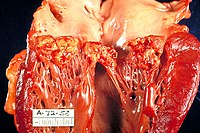
Photo from wikipedia
I have read the interesting case report by Khursheed et al,1 published in October 2018’s issue of Neurosciences (Riyadh). The authors nicely described a case of fulminant subacute sclerosing panencephalitis… Click to show full abstract
I have read the interesting case report by Khursheed et al,1 published in October 2018’s issue of Neurosciences (Riyadh). The authors nicely described a case of fulminant subacute sclerosing panencephalitis (SSPE) in a 20-month-old Indian patient who was fully vaccinated for measles.1 I have 2 comments on it. First, I agree with the authors’ presumption that it was difficult to attribute the diagnosis of SSPE in the studied patient to the vaccination received at 9 months and 16 months of age and that the possibility of subclinical measles infection probably overlooked by parents is most likely.1 However, they didn’t attempt to support their presumption. I presume that the following point might be relevant. It is noteworthy that anecdotal studies on the molecular characterization of the entire coding region of measles virus (MV) isolated from SSPE cases have shown certain biased hypermutations in certain sequences related to different genes, including M, H, N, F and D4. These hypermutations are known to play an important role in the glycoprotein interaction and to hamper the ability of measles virus strain to produce cell-free infectious viral particles, and ultimately incorporated in the maintenance of persistent infection, disease development, and fulminant escalation.2-5 Moreover, no genome sequences of measles vaccine strains were detected from SSPE cases.2-5 I presume that a similar molecular characterization of the whole genome of MV in the studied patient was envisaged. I presume that the task could not be contemplated probably due to financial constraints. Despite that limitation, the authors sent a sound message to the practicing pediatricians that SSPE must be considered in any child with mental and neurological deficits regardless of prior immunization for measles. Second, it is worthy to mention that early age exposure to measles predisposes to the development of SSPE and this risk is accentuated in human immunodeficiency virus (HIV)-positive children. The recent succession of measles outbreaks due to virus introduction in the pediatric population with suboptimal vaccine coverage or reducing immunity and co-existing pediatric HIV cohorts represents a matter of concern.6 I presume that underlying HIV infection could contribute to the fulminating clinical course in the studied patient. HIV infection is an important health threat in India. Despite no recent data are yet presented on the exact pediatric HIV seroprevalence, the available data pointed out to the substantial HIV seroprevalence rate of 1.03% among pregnant women in India.7 Regrettably, the HIV status of the mother of the studied patient was not defined. I presume that some sort of vertical HIV transmission ought to be taken into consideration in the studied patient. Therefore, planning for the diagnostic panel of blood CD4 lymphocyte count and viral overload estimations was envisaged in the studied patient. If that panel was contemplated and it disclosed HIV reactivity, the case in question could be truly regarded a novel case report of the youngest patient with HIV-associated SSPE published in the literature to date.
Journal Title: Neurosciences
Year Published: 2019
Link to full text (if available)
Share on Social Media: Sign Up to like & get
recommendations!